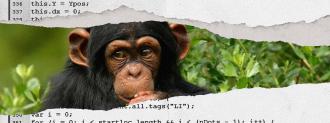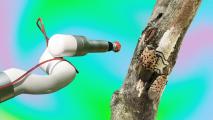The team barely knew each other when they boarded the plane bound for Kuching, Malaysia. They were all engineers, and they had one friend in common, but getting to know each other wasn’t their priority.
In the “Make for the Planet” challenge, in front of the International Marine Conservation Congress (IMCC5), they had one goal for the next four days: to create, design, and pitch an innovative solution to one of the world’s major marine conservation problems, like restoring coral reefs or monitoring global fish stocks.
They were all smart, skilled engineers, but there was just one problem — none of them had any expertise in marine science or animal conservation. But they knew where to find it.
To fill in the knowledge gaps, team members Cormac Hondros-McCarthy and Ted Zhu crowdsourced ideas and expertise on the Digital Makerspace (DMS) — an online community of thinkers who work together to identify the most crucial animal conservation problems and solutions.
The DMS describes itself as a “project pipeline,” where over 150 projects have been born or bred through online idea swapping and collaboration.
One project born through the platform, ChimpFace, is an app that uses facial recognition for animals to comb through social media, identifying illegally trafficked animals to help authorities track down the culprit. Conservationist Alexandra Russo came up with the idea and met computer vision expert Colin McComrick on the DMS to execute it.
Another project, Key Conservation, founded by Megan Cromp, is a financing and skills-sharing app for on-the-ground conservation efforts. Key Conservation is launching later this year.
Co-founders of Conservation X Labs believe in the innate desire for human collaboration, which they say has been underutilized.
In the fiercely competitive tech industry, you might think “sharing” ideas would mean losing your advantage. But Alex Dehgan and Paul Bunje, co-founders of Conservation X Labs, the parent company for the DMS, say otherwise. They believe in the innate desire for human collaboration, which they say has been underutilized in tech.
“Solving problems, for many, many people is its own reward. The Digital Makerspace represents an opportunity to really push that notion of collaboration and enable and empower people that want to work on difficult, difficult problems to work together and find the resources that are needed,” says Bunje, “so that we can find where the new, crazy, novel ideas come from and then flesh that out and turn them into real solutions.”
Dehgan says they took their inspiration from Open Source Drug Discovery, an initiative launched in India in 2008 to accelerate new drug development. If researchers and pharma could collaborate on often-neglected diseases, then surely Dehgan and his team could get people to join forces in solving today’s most pressing animal conservation problems.
Amy Richards, Conservation X’s “innovation storyteller,” says that the tech innovation company’s goal is to “leverage a community of solvers to end the 6th mass extinction,” referring to extinctions caused by human activity directly, like over-hunting, as well as by climate change.
They do this by presenting challenges on the Digital Makerspace, or via competitions like Make for the Planet.
In Malaysia, at the Make for the Planet competition, Hondros-McCarthy, Zhu, and the rest of the team selected “Ghost Gear” from the competition’s five ocean challenges. Ghost gear is lost or abandoned fishing gear, which continues to trap or entangle marine life; it is a big problem for marine life because of the sheer volume of equipment lost annually.
The team narrowed its focus to the lobster fishery. In Maine, lobstermen set as many as 2 million traps each day. Lobster traps sit on the seafloor but are connected to surface buoys with a long rope, which lobstermen use to retrieve the traps. It’s estimated that 100,000 to 200,000 traps are lost each year. Animal conservation researchers say that the North Atlantic Right Whales (NARW) are endangered mainly because of entanglements in fishing gear like this. Only about 400 still exist.
The team of engineers figured it was an area where they could make a real difference. But first they needed to bone up on things like how to fish for lobster and marine science.
“I was able to discover through the Digital Makerspace an entire community of engineers and conservation scientists who had ideas and opinions on solving different challenges. It didn’t take much time before people started sharing ideas, adding articles, making connections,” Zhu says.
Some teams turned to the Digital Makerspace for help building their idea, others looked to build a team from scratch.
“It’s not just conservationists that are going to build these next-generation solutions. It’s a conservationist and technologist and a marketer and a team of people with skills that very slightly overlap. They’re bringing very different things to the table. The respect they have for each other for having different experiences, different skill sets, is palpable,” says Tom Quigley, community manager at the DMS.
“It feels like what I can imagine Silicon Valley must have felt like twenty years ago — where you can have great ideas in rooms and discussions together, and you say, ‘You know that does sound like actually a really interesting idea. Who’s doing that?’ And the answer is — you.”
After connecting with experts in marine biology, animal conservation, and other fields , they came up with a ropeless lobster trap — a self-surfacing lobster trap that eliminates the need for the hundreds of feet of retrieval rope between the trap on the seafloor and the surface buoy.
The Digital Makerspace represents an opportunity to really push that notion of collaboration and enable and empower people that want to work on difficult, difficult problems…
Paul Bunje
Their project, called LobsterLift, went on to win the Make for the Planet hackathon. With the prize money, they built a prototype that they are now testing against a fleet of other ropeless fishing gear.
Lobstermen are experiencing more and more pressure to switch to ropeless gear. In May, a federal judge ruled that Massachutes state regulators violated the Endangered Species Act by licensing the lobstermen to use the vertical buoy lines — as the equipment found to cause more marine mammal casualties annually than the fishery is allowed.
Ropeless gear isn’t a new idea. In fact, it is nearly two decades old. But there haven’t been solutions widely employed by the finishing industry. They are either cost-prohibitive, cumbersome, or lacking in functionality. Hondros-McCarthy and Zhu say that LobsterLift addresses those issues.
Cofounders Dehgan and Bunje describe the power of the Digital Makerspace as the “power of the crowd.”
“Talent is everywhere. How do we increase the opportunity for people to join traditional conservationists in developing new breakthrough solutions that address the underlying drivers of extinction?” says Dehgan.
“There’s a kind of culture of risk-taking,” adds Bunje. “Crazy ideas are not off-limits. They are, in fact, encouraged.”






